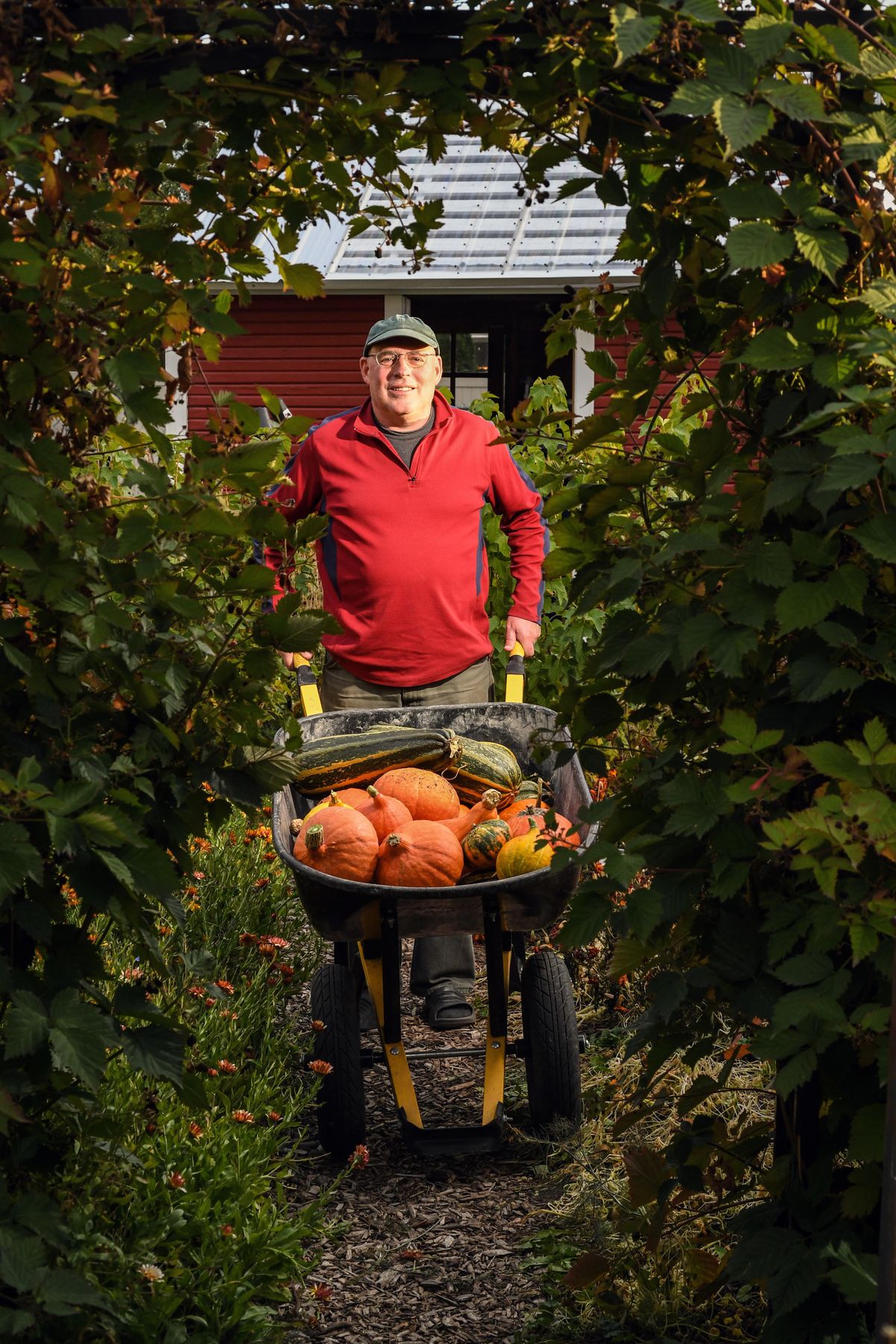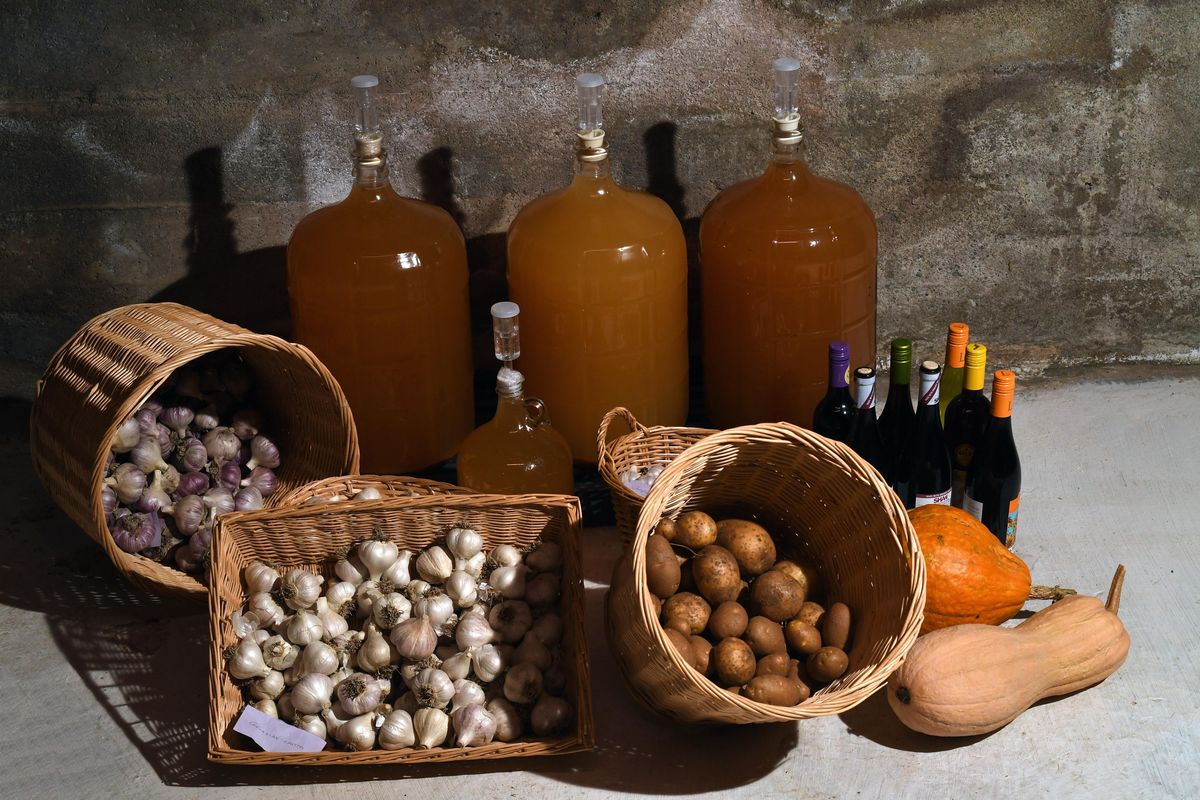Urban bounty: North Spokane couple plants produce aplenty, makes their own wine

A north Spokane couple has turned their entire back yard into a garden oasis that attracts birds, bees and squirrels in addition to providing a bounty of produce and berries for their plates.
The plants are done for the year, damaged by the recent frost, but critters were still visiting to get the last of the sunflower seeds and berries that weren’t harvested in time. “When a frost is coming, you have to decide what to do,” said Della Holbert. “We did a lot of processing early.”
The couple eats from their garden when things are in season, but also works to preserve food so they can enjoy it over the winter. “We did a lot of freezing this year,” said Matt Holbert. “Last year we did a lot of dehydrating.”
The couple picked their home on West Glass because it has a small house on a 13,000-square-foot lot so they could grow their own food. “Our goal with everything is to have a small footprint,” Matt Holbert said. “We don’t have a car. That’s what drives us.”
The couple wasn’t always that way. Della Holbert is Canadian, and the two met in Mexico. “I flew a lot,” said Matt Holbert. “I worked for a life insurance company. I kind of got tired of flying.”

The couple moved to Boise in 1992, where they became involved in groups dedicated to stopping urban sprawl. They even formed a nonprofit called the Livable Community Group dedicated to the issue.
“That got us reading a lot of different things,” Della Holbert said. “We did a lot of thinking. I guess that was the catalyst.”
They lived in Boise for three years until Matt Holbert took a different job that didn’t require a lot of travel. They moved to Spokane in 1998 and lived in a house on the South Hill where they could walk to the grocery store.
“We discovered that even if people could walk to places, they didn’t,” said Matt Holbert. “They drove.”
They lived in Victoria, British Columbia, for six months in 2006 and then returned to Spokane and moved around, living in apartments and doing long-term house sitting. They gave up their car eight years ago and fully dedicated themselves to living a less impactful life.
“Some of it has been a quality-of-life issue,” Matt Holbert said. “We got out, we drove a lot. We had a pretty big footprint for a while.”
The couple will rent a car on the rare occasions they need one, but they do everything from grocery shopping to visiting the hardware store on foot. They also ride their bikes and use city buses to get around.
The only thing Della Holbert said she misses about having a car is being able to take trips to forage for mushrooms and huckleberries. “We do miss that,” she said.
They took a permaculture class in 2012 that inspired the garden at their current home, which they purchased in 2016. “There wasn’t much outside,” Matt Holbert said. “There were mostly weeds.”
They planted a mixture of buckwheat, rye grass and Austrian peas all through the yard. After if grew tall, they cut it and used a rototiller to mix it into the soil. “It puts a lot of nitrogen back in the soil when you rototill that back in,” said Della Holbert.
The first thing they planted was garlic. This year they harvested 44 pounds of it. The rest of the yard is full of a little bit of everything.
They grow a variety of herbs as well as squash, beans, broccoli, cabbage, okra, onions, tomatoes, pumpkins, carrots, hot and sweet peppers, asparagus, peas, beets, potatoes, zucchini and Brussels sprouts. They also grow kale for kale chips.
The raspberries were abundant this year, and the couple has huge bags of them in the freezer in their garage. “It’s kind of overwhelming how many there are to pick,” Matt Holbert said.
They also have planted several varieties of grapes, which they press themselves to make wine. “This year we got 600 pounds of grapes,” Della Holbert said.
There are several fruit trees in the backyard that produce apricots, nectarines, peach, plums, pears and apples.
This year the warm overnight temperatures affected how much the garden produced, Matt Holbert said. When the first frost hit, there was still a lot of produce on the vine. “A lot of stuff didn’t ripen this year,” he said.
In the fall, they let their plants go to seed so they can collect the seeds for next year. Though they did a lot of rototilling in the beginning to establish the garden, they no longer do so.
“For the most part, we don’t till,” Matt Holbert said. “We more do chop and drop. We don’t have a compost pile per se.”
They do have a small area where they compost their kitchen scraps, and in the fall they collect leaves from their neighbors to spread over the ground to decompose. “If you leave them in bags, they break down and almost make a soil,” Della Holbert said.
The couple also planted most of their front yard in clover, which is a big hit with bees and the occasional deer. There are flowers planted throughout the front and back yards. “I want to have pretty stuff, too,” she said.
Their large garden provides a significant portion of their food, Matt Holbert said. “I think if we used everything, it could be about 50%,” he said. “It’s probably about 20%.”
The garden will continue to grow and change over the years as they learn what grows well and what doesn’t. The couple recently added hops planted on the side of the house. “Some of these things, it takes years to get into production,” Della Holbert said.
Matt Holbert said his family had a large garden when he was growing up, but he doesn’t think that many people are exposed to that these days. “I think a lot of people find it daunting,” he said.
But thanks to their efforts, the couple will be able to use fresh peppers and pesto in their winter cooking while sipping on homemade wine. They appreciate the fact that their garden provides a bounty for animals, as well.
“We have so many honey bees in the back yard,” Della Holbert said. “The whole place is just humming.”